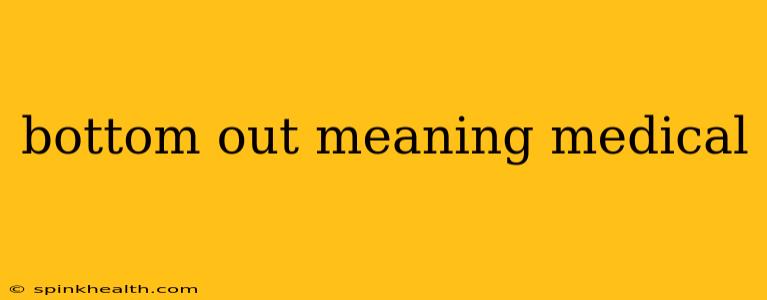Bottoming Out: Understanding the Medical Meaning and Implications
The term "bottoming out" in a medical context doesn't refer to a single, universally defined condition. Instead, it's a descriptive phrase used to indicate a critical low point in a patient's health or a specific health parameter. It often implies a crisis point, a significant decline from which recovery might be challenging but not impossible. The specific meaning depends heavily on the context – what system or aspect of health is being discussed. Let's explore some scenarios where you might hear this term.
What does "bottoming out" mean in medicine? (Addressing the core question directly)
In the medical field, "bottoming out" describes a situation where a patient's condition reaches its nadir. It signifies a critical point in their illness where vital signs or other health indicators have reached their lowest point. This might relate to organ function, blood pressure, mental health, or other aspects of health. Think of it as the lowest point before a potential turning point, either for better or, unfortunately, worse.
What does it mean when someone's blood pressure bottoms out?
This describes a dangerously low blood pressure reading, also known as hypotension. It occurs when blood pressure drops too low to adequately supply oxygen and nutrients to the body's organs. This can lead to organ damage, shock, and even death if not addressed immediately. Causes range from severe dehydration and internal bleeding to certain medications and underlying health conditions. If someone's blood pressure "bottoms out," it's a medical emergency.
What are the signs of bottoming out mentally?
"Bottoming out" in a mental health context refers to reaching a point of complete despair and hopelessness. It's a crisis point where someone feels they can no longer cope with the challenges in their life. This often manifests as:
- Severe depression: Intense sadness, loss of interest in activities, feelings of worthlessness, and suicidal ideation.
- Substance abuse: Increased reliance on drugs or alcohol as a coping mechanism.
- Social isolation: Withdrawing from friends, family, and social activities.
- Self-neglect: Ignoring basic hygiene, neglecting responsibilities, and neglecting self-care.
This is a serious situation requiring urgent professional help. It's crucial to seek assistance from a mental health professional, a crisis hotline, or a trusted support system.
What are the medical implications of bottoming out?
The implications of "bottoming out" are serious and depend entirely on the context. However, common threads include:
- Risk of organ damage: Insufficient blood flow or oxygen to vital organs due to low blood pressure or other physiological failures.
- Life-threatening complications: Conditions like shock, respiratory failure, and cardiac arrest can arise.
- Increased mortality risk: The further a person's health deteriorates before intervention, the greater the chance of a negative outcome.
- Prolonged recovery: Even with intervention, recovery from a severe "bottoming out" event can take considerable time and effort.
How is "bottoming out" treated medically?
Treatment entirely depends on the underlying cause. It might involve:
- Emergency medical care: Intravenous fluids, medications to raise blood pressure, or mechanical ventilation, depending on the nature of the crisis.
- Mental health treatment: Psychotherapy, medication, hospitalization, and support groups for individuals experiencing mental health crises.
- Addressing the underlying condition: Treating infections, addressing substance abuse, or managing chronic illnesses can prevent future "bottoming out" events.
"Bottoming out" is a serious medical term indicating a critical point in a patient's health. While it signifies a low point, it doesn't necessarily predict a negative outcome; prompt and appropriate medical intervention is crucial for recovery and improved prognosis. If you or someone you know experiences a "bottoming out" event, seek immediate medical help.

